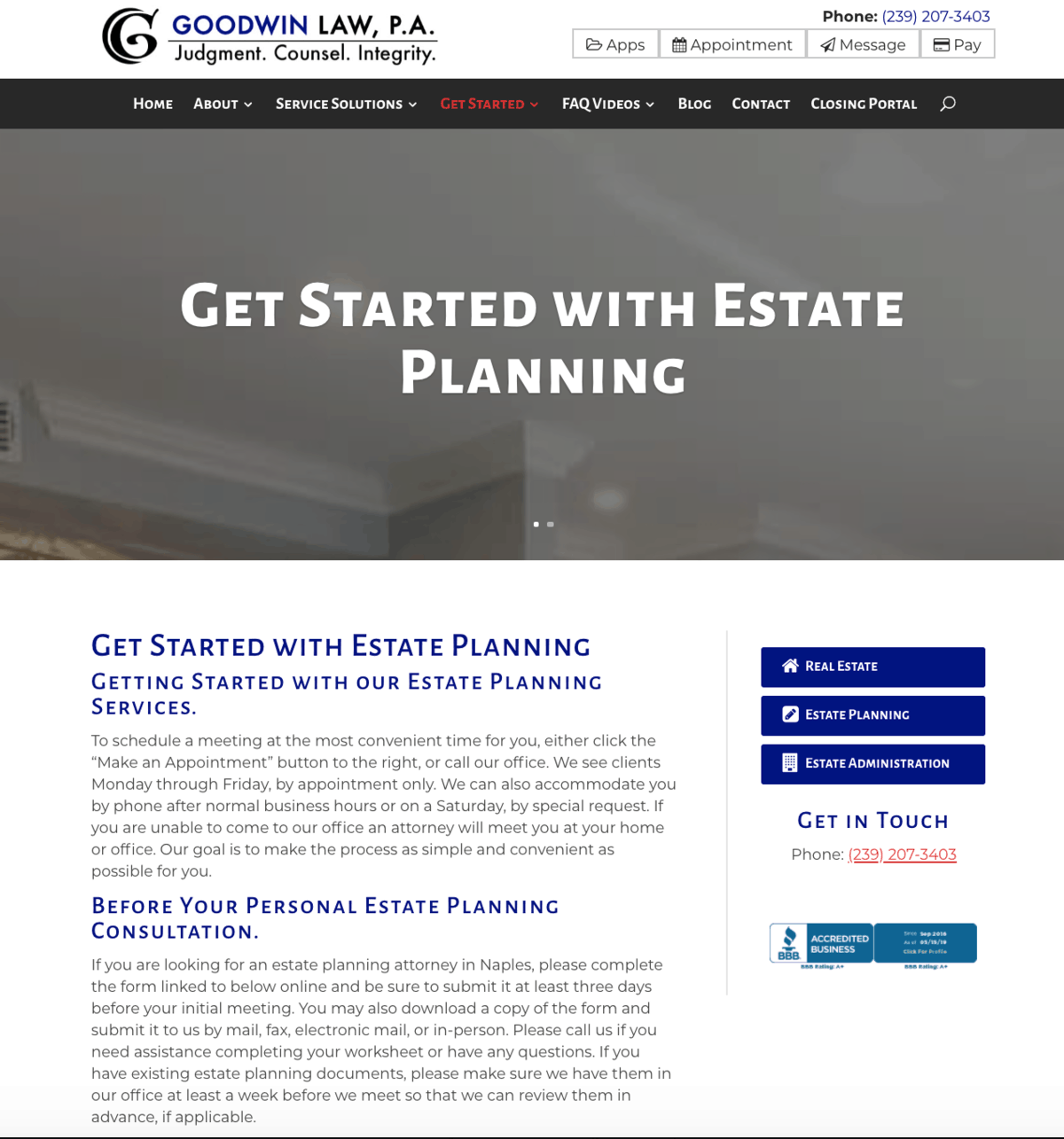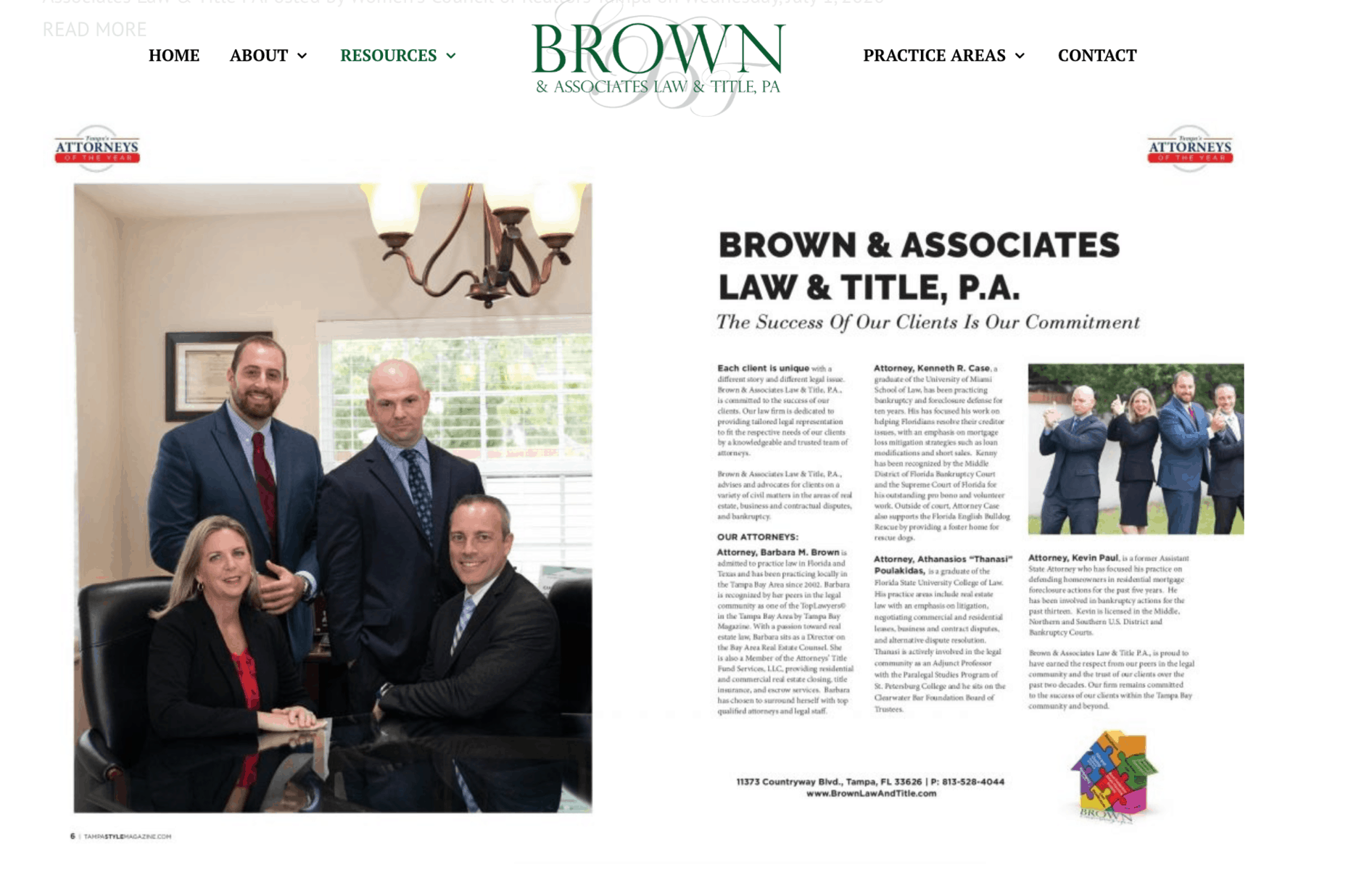Nobody wants to think about death, especially their own. This may explain why only about 33 percent of Americans have an estate plan.
But as an estate planning attorney, you know there are a lot of benefits to getting your affairs in order – even if it may be uncomfortable. You need to emphasize these benefits to your clientele, especially in your marketing efforts. Once your clients understand just how important an estate plan is for preserving their assets and ensuring their loved ones are protected, they’ll be more likely to meet with you to discuss their options.
In fact, we created this digital marketing guide for attorneys, which includes strategies that can benefit all of your practice areas.
In this post, we’re taking it a step further and sharing eight creative marketing ideas for how estate planning law firms can generate more traffic and clients. Many of these ideas are cost-effective and require just a bit of effort and empathy to execute.
- Record FAQ videos for YouTube
- Share your process on your website
- Keep your website updated
- Encourage happy clients to leave a review on your Facebook page
- Sponsor local organizations
- Send a physical newsletter
- Write team bios
- Invest in PPC ads
1. Record FAQ videos for YouTube
When it comes to estate planning, chances are your clients will have a ton of questions. Recording FAQ videos that you share on YouTube offers a great resource for both existing and potential clients. These videos answer questions that can be difficult or lengthy to explain through text alone, and can help make your services more accessible to those who are audio learners. FAQ videos can also help with search engine optimization (SEO) and establish you as the go-to estate planning attorney in your area.
For example, here is a FAQ-style video on the top 5 estate-planning mistakes, shared by a Texas-based estate planning attorney on YouTube.
If you’re not sure what questions to start with, think about any questions you have been asked by three or more of your clients. Some examples include how to avoid inheritance disputes, where to get started in drafting a will, and when you need a will.
You may also want to think about some common misconceptions your clients have had—for example, thinking that only wealthy people or people with many heirs need a will or estate plan. Talk to your friends or family members who are less familiar with your work and see what general questions they have about estate planning.
These conversations can be a great starting point for your FAQ video content.
2. Share your process on your website
Creating a will or getting your personal estate planning in order can be overwhelming.
You can put people at ease by creating a getting started page (such as this example from our customer, Goodwin Law P.A.) talking about your process and what a new client can expect. Providing this kind of roadmap can make it more likely that clients will schedule a call.
An added advantage of documenting your process is that it demonstrates expertise and makes you look more professional.
3. Keep your website updated
Search engines reward websites that are frequently updated. This means that sites with relevant, fresh content are more likely to show up in organic search results. One simple way to create useful content on a regular basis is case studies and reviews.
A great case study shows how the service(s) you provide helped one of your clients. This in turn builds trust.
4. Encourage happy clients to leave a review on your Facebook page
Law firms without a social media presence risk becoming invisible to their potential clients. When researching local businesses or services, many people today turn to social media for reviews and business profiles. If you don’t have online content, many may assume your firm is closed—or doesn’t exist at all.
By posting helpful content on your Facebook page and encouraging your clients to leave a review, prospects can see that your firm is knowledgeable and does great work.
5. Sponsor local organizations
Sponsoring local events and nonprofits is a great way to get your name out and give back to your community. There are many routes you can go with this, including sponsoring:
- A charity event for a cause you are passionate about
- Your kid’s baseball team
- An industry conference
You can use this sponsorship as a discussion point in any regular communications with your clients and prospective clients—like newsletters, discussed below.
6. Send a physical newsletter
Creating a regular newsletter keeps you top of mind with prospects and customers alike. While most firms send email newsletters, you can set yourself apart (and avoid being buried in busy inboxes) by sending them through regular mail. This is what our customer, Brown & Associates, does.
As for the type of content you include, it will depend on your specific law firm. A good place to start would be sharing company news, press releases, new employees joining the firm, and any industry updates.
7. Write team bios
Showcasing your legal team with bio write-ups is a great way to add a personal touch to your firm. It lets potential clients know that people in your firm are approachable and helps to establish trust. It also helps set your law office apart from others in the area.
When creating authentic team bios, it helps to touch on credentials such as education and awards, but this shouldn’t be the main focus. The goal is to show the personal side of your firm, so include interesting details like kids, pets, hobbies, or favorite movies.
8. Invest in pay-per-click ads
Pay-per-click, or PPC, is a form of advertising where advertisers pay a fee each time an ad is clicked. Search engine advertising, like Google Ads, is a common PPC model. This means that traffic generated from PPC is not the same as organic search traffic or search results that are found through SEO.
If you decide to invest in PPC, it helps to have a dedicated landing page. This means that when someone clicks your ad, they’ll be directed to a specific page on your website with a single focus, such as to schedule a free consultation.
For example, if your ad is about business succession planning, the landing page would describe in detail how your law firm helps people with this service. It would end with a call to action (“CTA”) that drives the visitor to contact the attorney for a consultation to get started with business succession planning.
The key to picking the right tactic to try first is to just get started. Your marketing doesn’t have to be perfect, but it won’t be effective if you keep pushing it off until you have the right plan. Look at the tactics above, select one or two that make sense for your firm, and execute. You can always try something else down the road.
Contact TitleTap for Your Marketing Needs
Today’s attorneys are busier than ever. It can be hard to pivot from providing actionable legal advice to designing and optimizing your firm’s website.
TitleTap can help your firm automate your marketing process. Some providers offer piecemeal services that require you to do the legwork to put them all together. But at TitleTap, we provide turnkey, customized websites and marketing services for law firms and are experts in SEO marketing.
Our three plans can be tailored to your needs and budget: Website only, Website+SEO, and Website+SEO+Ads. By integrating our approach, we can increase your firm’s ranking and optimize your digital experience.
You’re the estate planning experts—let the website experts at TitleTap handle your marketing needs. Visit our website or give us a call to request a demo today!





